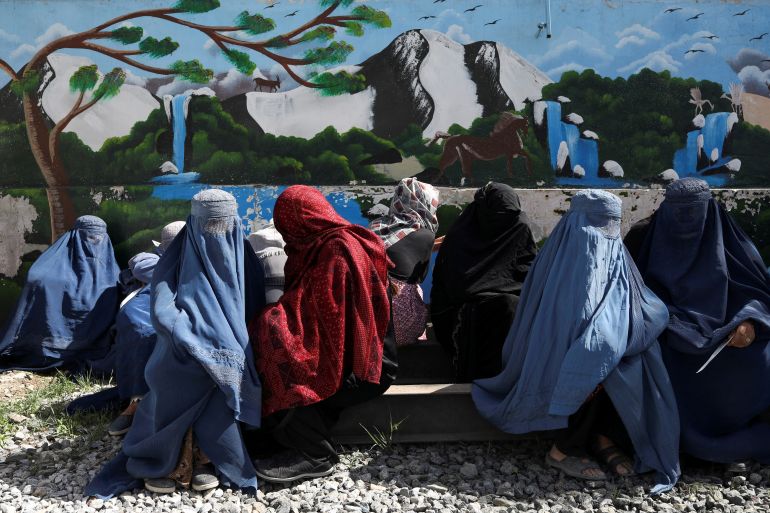UN says six million Afghans are at risk of famine as crises grow
Humanitarian chief Martin Griffiths urges donors to immediately provide $770m as the population battles hunger, climate change and conflict.

The UN humanitarian chief has urged donors to restore funding for development in Afghanistan that was frozen when the Taliban took over a year ago, warning that six million people were at risk of famine.
Martin Griffiths told the United Nations Security Council that Afghanistan faces multiple crises – humanitarian, economic, climate, hunger and financial – and that donors should immediately provide $770m to help Afghans survive the coming colder months.
Keep reading
list of 4 itemsUS judge says 9/11 victims not entitled to Afghan bank assets
Afghanistan floods kill more than 180, Taliban say
Afghan evacuees protest in UAE over slow resettlement
Conflict, poverty, climate shocks and food insecurity “have long been a sad reality” in Afghanistan, but he said what makes the current situation “so critical” is the halt to large-scale development aid.
“Poverty is deepening, the population is still growing, and the de facto authorities have no budget to invest in their own future. It’s clear to us that some development support needs to be restarted,” Griffiths said.
More than half of Afghanistan’s 39 million people need humanitarian help and six million are at risk of famine. More than a million children are “estimated to be suffering from the most severe, life-threatening form of malnutrition” and could die without proper treatment, he said.
“Afghanistan’s de facto authorities must also do their part. Bureaucratic interferences and procedures slow down humanitarian assistance when it is needed most. Female humanitarian aid workers … must be allowed to work unhindered and securely. And girls must be allowed to continue their education,” he said.
The Taliban has not been formally recognised by any foreign governments and is still subjected to international sanctions, which the UN and aid groups say are now hindering humanitarian operations in the country.
Griffiths said $614m is urgently required to prepare for winter – including repairing and upgrading shelters and providing warm clothes and blankets – and an additional $154m to organise food and other supplies before the weather restricts access to certain areas.
With more than 70 percent of Afghans living in rural areas, Griffiths warned that if agriculture and livestock production are not protected “millions of lives and livelihoods will be risked, and the country’s capacity to produce food imperilled.”
He said the country’s banking and liquidity crisis, and the extreme difficulty of international financial transactions must also be tackled.
“The consequences of inaction on both the humanitarian and development fronts will be catastrophic and difficult to reverse,” Griffiths warned.
Billions of dollars in Afghan central bank reserves, held mainly in the United States, have also been frozen by foreign governments to prevent them from falling into Taliban hands. Russia, which called the UN Security Council meeting on the eve of the first anniversary of the US withdrawal from Afghanistan, and China have called for those funds to be released.
Russia’s UN Ambassador Vassily Nebenzia accused the US and its allies of abandoning Afghans to face “ruin, poverty, terrorism, hunger and other challenges”.
“Instead of acknowledging their own mistakes and supporting the reconstruction of the destroyed country,” he said, they blocked Afghan financial resources and disconnected its central bank from SWIFT, the dominant system for global financial transactions.
China’s UN Ambassador Zhang Jun also accused the US and its allies of “evading responsibility and abandoning the Afghan people” and imposing “political isolation and blockade”.
US Ambassador to the United Nations Linda Thomas-Greenfield said: “No country that is serious about containing terrorism in Afghanistan would advocate to give the Taliban instantaneous, unconditional access to billions in assets.”
Thomas-Greenfield said the US was the top aid donor to Afghanistan and criticised Russia and China: “If you want to talk about how Afghanistan needs help, that’s fine. But we humbly suggest you put your money where your mouth is.”